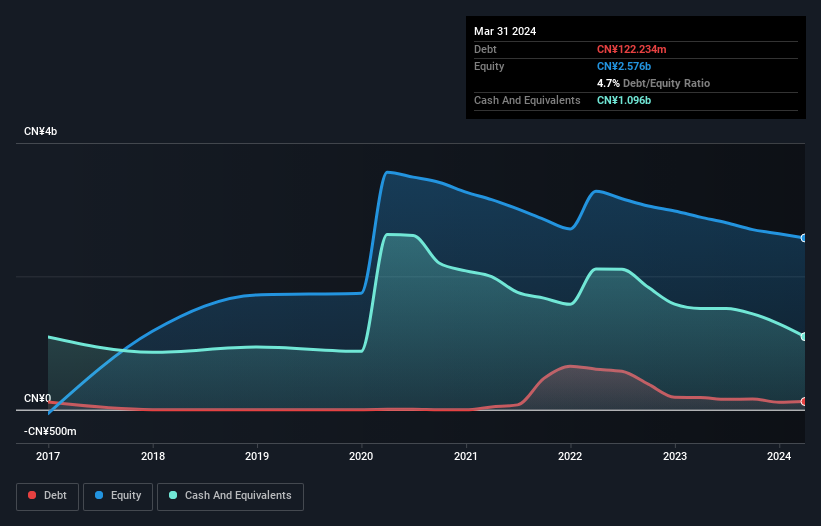The external fund manager backed by Berkshire Hathaway's Charlie Munger, Li Lu, makes no bones about it when he says 'The biggest investment risk is not the volatility of prices, but whether you will suffer a permanent loss of capital.' It's only natural to consider a company's balance sheet when you examine how risky it is, since debt is often involved when a business collapses. As with many other companies UCloud Technology Co., Ltd. (SHSE:688158) makes use of debt. But the more important question is: how much risk is that debt creating?
Why Does Debt Bring Risk?
Debt assists a business until the business has trouble paying it off, either with new capital or with free cash flow. If things get really bad, the lenders can take control of the business. However, a more frequent (but still costly) occurrence is where a company must issue shares at bargain-basement prices, permanently diluting shareholders, just to shore up its balance sheet. Of course, debt can be an important tool in businesses, particularly capital heavy businesses. The first thing to do when considering how much debt a business uses is to look at its cash and debt together.
See our latest analysis for UCloud Technology
How Much Debt Does UCloud Technology Carry?
The image below, which you can click on for greater detail, shows that UCloud Technology had debt of CN¥122.2m at the end of March 2024, a reduction from CN¥182.2m over a year. However, its balance sheet shows it holds CN¥1.10b in cash, so it actually has CN¥973.3m net cash.

How Healthy Is UCloud Technology's Balance Sheet?
The latest balance sheet data shows that UCloud Technology had liabilities of CN¥963.6m due within a year, and liabilities of CN¥101.7m falling due after that. Offsetting these obligations, it had cash of CN¥1.10b as well as receivables valued at CN¥504.1m due within 12 months. So it actually has CN¥534.3m more liquid assets than total liabilities.
This surplus suggests that UCloud Technology has a conservative balance sheet, and could probably eliminate its debt without much difficulty. Simply put, the fact that UCloud Technology has more cash than debt is arguably a good indication that it can manage its debt safely. There's no doubt that we learn most about debt from the balance sheet. But you can't view debt in total isolation; since UCloud Technology will need earnings to service that debt. So if you're keen to discover more about its earnings, it might be worth checking out this graph of its long term earnings trend.
Over 12 months, UCloud Technology made a loss at the EBIT level, and saw its revenue drop to CN¥1.5b, which is a fall of 17%. We would much prefer see growth.
So How Risky Is UCloud Technology?
By their very nature companies that are losing money are more risky than those with a long history of profitability. And in the last year UCloud Technology had an earnings before interest and tax (EBIT) loss, truth be told. And over the same period it saw negative free cash outflow of CN¥368m and booked a CN¥310m accounting loss. But the saving grace is the CN¥973.3m on the balance sheet. That kitty means the company can keep spending for growth for at least two years, at current rates. Even though its balance sheet seems sufficiently liquid, debt always makes us a little nervous if a company doesn't produce free cash flow regularly. When analysing debt levels, the balance sheet is the obvious place to start. But ultimately, every company can contain risks that exist outside of the balance sheet. These risks can be hard to spot. Every company has them, and we've spotted 1 warning sign for UCloud Technology you should know about.
At the end of the day, it's often better to focus on companies that are free from net debt. You can access our special list of such companies (all with a track record of profit growth). It's free.
New: AI Stock Screener & Alerts
Our new AI Stock Screener scans the market every day to uncover opportunities.
• Dividend Powerhouses (3%+ Yield)
• Undervalued Small Caps with Insider Buying
• High growth Tech and AI Companies
Or build your own from over 50 metrics.
Have feedback on this article? Concerned about the content? Get in touch with us directly. Alternatively, email editorial-team (at) simplywallst.com.
This article by Simply Wall St is general in nature. We provide commentary based on historical data and analyst forecasts only using an unbiased methodology and our articles are not intended to be financial advice. It does not constitute a recommendation to buy or sell any stock, and does not take account of your objectives, or your financial situation. We aim to bring you long-term focused analysis driven by fundamental data. Note that our analysis may not factor in the latest price-sensitive company announcements or qualitative material. Simply Wall St has no position in any stocks mentioned.
Have feedback on this article? Concerned about the content? Get in touch with us directly. Alternatively, email editorial-team@simplywallst.com
About SHSE:688158
UCloud Technology
Researches and develops cloud computing technology platform solutions.
Excellent balance sheet and overvalued.
Market Insights
Community Narratives


Recently Updated Narratives


MINISO's fair value is projected at 26.69 with an anticipated PE ratio shift of 20x


The Quiet Giant That Became AI’s Power Grid


Nova Ljubljanska Banka d.d will expect a 11.2% revenue boost driving future growth
Popular Narratives


The company that turned a verb into a global necessity and basically runs the modern internet, digital ads, smartphones, maps, and AI.


MicroVision will explode future revenue by 380.37% with a vision towards success



